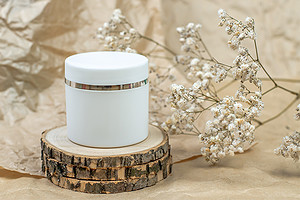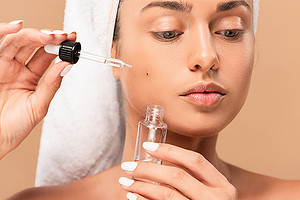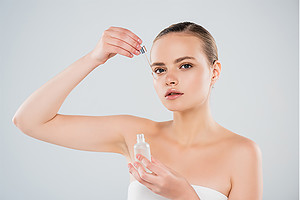A regular night skin care routine is crucial in maintaining skin health. And while there is not a one-size-fits-all routine, there is a basic regimen that everyone must have in place.

You can get glowing and healthy skin every day by following a night skin care routine. For healthy, clear, and young skin, it is vital to provide the skin the nourishment it requires during the day and night before you go to bed.
Night skin care products repair skin cells to ensure fast healing. Antiaging products, too, work best at night when the body is at rest.
Naturally relaxing your skin during the night has several advantages. For instance, it makes your skin resilient during the day while accelerating the regeneration of skin cells at nighttime.
Article Contents
Recommended Nighttime Skin Care Routine
To come up with a practical and beneficial nighttime skin care routine, follow these tricks:
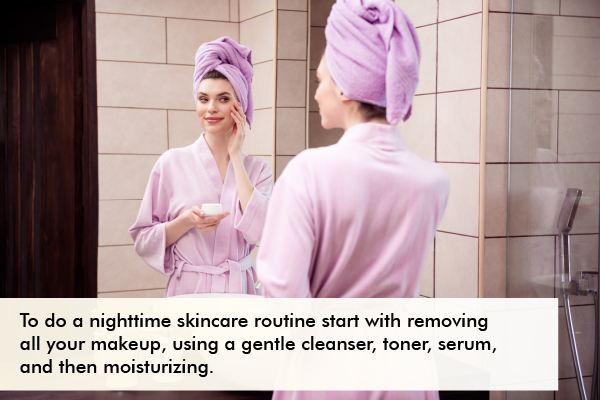
1. Remove all your makeup
The real struggle of wearing makeup is getting rid of it at the end of a long and tiring day. There can be days when your signature winged eyeliner or heavy matte lipstick won’t come off after rinsing several times or scrubbing vigorously.
Thus, there needs to be more than a cleanser to eliminate all the makeup. You need a powerful makeup remover that eliminates all your makeup effortlessly and leaves skin hydrated and smooth.
2. Use a gentle cleanser
Cleansers are also a necessary part of an effective skin care regimen as they are formulated to get rid of the skin of grime, debris, dust, or excess oils while maintaining the health of the skin barrier. (1)
Cleansers aid in protecting the external skin layer. Using a gentle cleanser free of additives such as dyes, fragrances, sulfates, and parabens is vital.
3. Apply a toner
Toning after cleansing can smoothen, calm, and soften the skin. It is important to use a toner, especially if you have oily skin as it aids in removing any dust or oil that the cleanser cannot entirely remove.
Some toners contain additional ingredients that help in exfoliating the skin, such as glycolic acid. (2)
4. Apply a serum
Serums are concentrated formulations designed to sink into the skin fast and contain an intensive dose of ingredients that can resolve most common skin complaints.
Serums are beneficial for oily skin as it aids in reducing the appearance of pores with constant use. Examples of these serums are those with low concentrations of vitamin C, (3) vitamin E, (4) and ferulic acid. (5) Serums that contain antioxidants such as resveratrol and tea polyphenols target wrinkles.
Other beneficial ingredients are is retinol, which helps to decrease inflammation, and niacinamide. (6) Retinol may only suit some, so check with a dermatologist before using a retinol-based serum. Also, if you use retinol after BHA-AHA products, wait for at least 30 minutes before layer other products.
Choose a serum that has calming and hydrating ingredients. Select one that is formulated especially for sensitive skin.
However, if you have inflammation or redness in your skin, eliminate retinoids. (7)
5. Moisturize
Like cleansers, you must be a little picky about moisturizers. Moisturizers lock moisture in the skin, improving the skin’s hydration and making your skin smooth and soft.
Select a lightweight or gel-based moisturizer for oily skin and a noncomedogenic moisturizer (8) for acne-prone skin. Moreover, opt for hypoallergenic and fragrance-free moisturizers as they can keep your skin hydrated without irritating it. (9)
You may occasionally use gel-based masks overnight as they feel soothing on irritated skin and keep the skin hydrated. You can also use a lactic acid serum as it is fit for sensitive skin.
Remember to use a moisturizer before you go to bed. Apply moisturizer after washing your face, or else the cleanser can leave your skin dry. You can apply moisturizer after you use a toner.
What Happens When You Have Sensitive Skin?
Sensitive skin is defined by subjective complaints of discomfort without any visible symptoms of irritation, which might be triggered by hypersensitivity. (10) This skin type is at risk of skin disease and allergies.
Some factors that can trigger sensitivity are dirt, pollution, medicines, skin diseases such as rosacea, and some foods. (11)
If your skin is sensitive, you will need help finding the correct makeup and skin care products as any change in the products you use can lead to bad skin reactions. The best principle to follow is that any product you apply must be nonirritating to the skin as it is soft and delicate. So, always do a patch test before using new skin care products.
Why Is a Night Skin Care Routine Necessary?
At night, your skin can relax, breathe, and repair all the damage that occurred during the day. It actively generates new skin cells to improve its texture.
When the skin pores are clogged, there is no probability for the skin to carry out the process of repairing and breathing. Following a rigorous skin care routine at night assists in your skin’s restoration.
Your night skin care regimen must help in the skin’s hydration, deep cleansing, renewal, and treatment of skin conditions.
What Time Must I Do My Night Skin Care Routine?
Professionals claim that the best time for a nighttime skin care routine is half an hour before bed as you can transfer the applied products on the pillow if you sleep immediately. In addition, it takes at least 20 minutes for products to get absorbed into the skin.
General Queries Related to Nighttime Skin Care Routine
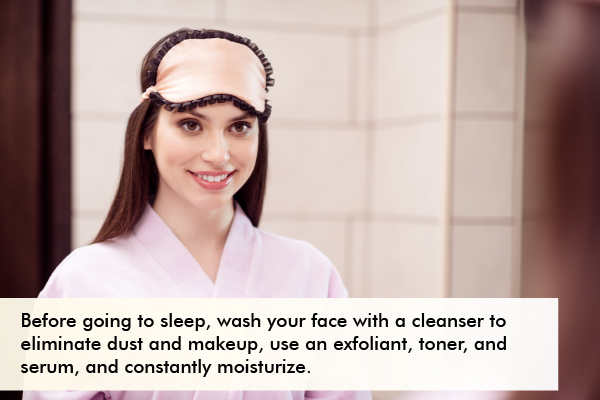
Should I use toner for my sensitive skin?
Yes, certainly. Just make sure to select the best toner for your skin. According to skin specialists, a toner that contains moisturizing ingredients such as hyaluronic acid and glycerin is suitable for sensitive skin.
If you have sensitive skin, it is also advisable to eliminate alcohol-based toners as they can strip off the moisture from your skin cells and lead to irritation.
Can I skip my skin care routine for a night?
No. Nighttime skin care helps in repairing and cleansing facial skin. Before going to sleep, you must wash your face with a cleanser to eliminate dust and makeup, and then use an exfoliant, toner, and serum. Always end with moisturizer.
Final Word
When you fall asleep, your body fixes the skin’s barrier by repairing damaged skin cells. Following a nighttime skin care routine revitalizes and prepares the skin to deal with environmental aggressors the next day.
Choose suitable night products for your skin type, especially if you have sensitive skin, to wake up to healthy skin. To be safe, stick to gentle and mild skin care products.
References
- Gentle cleansing and moisturizing for patients with atopic dermatitis … https://www.researchgate.net/publication/51435687/.
- Formulation and physical characterization of herbal face Gel Toner. https://www.researchgate.net/publication/353584527/.
- Telang PS. Vitamin C in dermatology. Indian dermatology online journal. https://www.ncbi.nlm.nih.gov/pmc/articles/PMC3673383/. Published April 2013.
- Keen MA, Hassan I. Vitamin E in dermatology. Indian dermatology online journal. https://www.ncbi.nlm.nih.gov/pmc/articles/PMC4976416/. Published 2016.
- Cavalcanti GR; Duarte FIC; Converti A; de Lima ÁAN; Ferulic acid activity in topical formulations: Technological and scientific prospecting. Current pharmaceutical design. https://pubmed.ncbi.nlm.nih.gov/33081675/.
- D; WJK. Niacinamide – mechanisms of action and its topical use in dermatology. Skin pharmacology and physiology. https://pubmed.ncbi.nlm.nih.gov/24993939/.
- Retinoid or retinol? American Academy of Dermatology. https://www.aad.org/public/everyday-care/skin-care-secrets/anti-aging/retinoid- retinol.
- Sethi A, Kaur T, Malhotra SK, Gambhir ML. Moisturizers: The slippery road. Indian journal of dermatology. https://www.ncbi.nlm.nih.gov/pmc/articles/PMC4885180/. Published 2016.
- Purnamawati S, Indrastuti N, Danarti R, Saefudin T. The role of moisturizers in addressing various kinds of dermatitis: A review. Clinical medicine & research. https://www.ncbi.nlm.nih.gov/pmc/articles/PMC5849435/. Published December 2017.
- Spada F, Lui AH, Barnes TM. Use of formulations for sensitive skin improves the visible signs of aging, including wrinkle size and elasticity. Clinical, cosmetic and investigational dermatology. https://www.ncbi.nlm.nih.gov/pmc/articles/PMC6559254/. Published June 6, 2019.
- Development of skin care routine support system – researchgate. https://www.researchgate.net/publication/327992788/.





